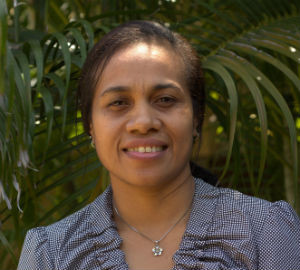Information and telecommunications technology can be a driver of new jobs and business efficiency in Papua New Guinea. Technology specialist Priscilla Kevin tells Business Advantage PNG of her own venture into the ICT business and suggests how others might follow.

In4net’s Priscilla Kevin
‘Priscilla Kevin is one of the younger generation of PNG entrepreneurs,’ notes Paul Barker, Executive Director of the Institute of National Affairs in Port Moresby, ‘and one of an even smaller group of confident and worldly women entrepreneurs, who has stepped into the traditionally male enclave of engineering and ICT [information and communications technology].’
Kevin runs a Port Moresby-based ICT consultancy, In4net, which she set up in 2013. It now provides ICT management and advisory services, financial business data analysis and general consulting services to around 20 companies.
New industry
‘When I was at the National High, before I chose computer science, I was offered a scholarship to be a pilot. But I was very interested in computer science,’ says Priscilla.
‘It was a new industry,’ she tells Business Advantage PNG.
‘The ICT industry has great potential, but the environment in which it operates needs to be looked at.
‘We are in the knowledge era and the internet and ICT is very new to the country, just over 10 years old, so there is great interest in the ICT industry as a career.’
Much of the sector’s unharnessed potential is in the rural sector, where electricity often doesn’t exist and the cost of internet access is high.
‘Rural people don’t have access to basic key information to enable them to grow their communities to develop their communities.
‘Power is just one of the bigger challenges, especially for businesses. They can’t use ICT because of the power, the high cost of the internet.’
Cluster
Last year, Kevin participated in the European Union’s Business Climate program, which brought together ICT specialists in PNG to ‘to create collaboration, connect with government and the private sector.’ [It was one of four such clusters in the Pacific—the others were in Tonga, Samoa and Vanuatu.]
A major barrier to developing a culture of entrepreneurship in PNG, she says, is the cost of starting up a new business.
An outcome of the cluster work has been to begin talks with the national government on creating an Intellectual Property Rights (IP) law.
‘We’re saying there is potential for PNGs to invent and innovate but we don’t have any IP protection in PNG,’ says Kevin.
Entrepreneurial spirit
Other initiatives include advocating tax incentives for ICT SMEs, reducing internet costs, and promoting entrepreneurship, mentorship and venture capital market opportunities for PNG businesses.
‘There has a lot of focus on entrepreneurship and last year we started up our first entrepreneurship training with Australian Business Volunteers. It involves one month’s training mentorship.
‘We’re trying to create an entrepreneurial spirit.’
Challenges
The PNG Government currently legislating to encourage the development of small business. A major barrier to developing a culture of entrepreneurship in PNG, Kevin thinks, is the cost of starting up a new business.
‘The major cost is rent. Real estate is really expensive and so is Internet cost, but it is also difficult to promote who you are, and what you do.’
Over the next 12 months, Kevin wants to grow her business and that highlights another challenge for entrepreneurs—access to funding.
‘Startups do not always have the much-needed capital to accelerate an idea,’ notes Kevin.
The post Could Papua New Guinea develop a generation of technology entrepreneurs? appeared first on Business Advantage PNG.